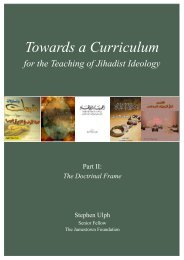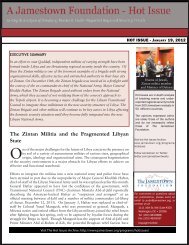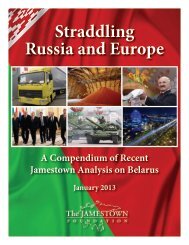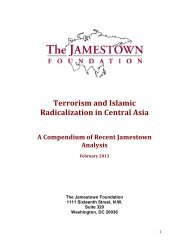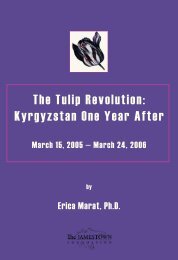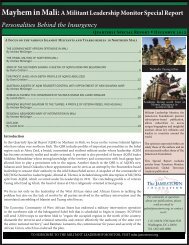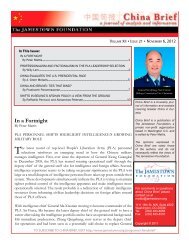By Brian Glyn Williams - The Jamestown Foundation
By Brian Glyn Williams - The Jamestown Foundation
By Brian Glyn Williams - The Jamestown Foundation
Create successful ePaper yourself
Turn your PDF publications into a flip-book with our unique Google optimized e-Paper software.
During the Long War in Hungary, Sinan Pasha used the Tatars as scapegoats to explain his poor<br />
performance on at least one occasion. 187 Barker mentions that Kara Mustafa also went to extraordinary<br />
lengths to put the blame for his failure at Vienna on his enemy the Crimean Khan. 188<br />
Kurat claims that it was actually the Grand Vezir's poor planning that enabled the Christians to overcome<br />
the Ottoman army in 1683. 189 Had the Vezir listened to the Khan's advice and sent the Janissaries against the<br />
Poles, the outcome of this battle might have been different. Howorth actually gives the Tatars special credit<br />
in the battle at Vienna claiming that it was the Khan's forces that retrieved the standard of the prophet<br />
during the Ottoman retreat. 190<br />
On occasion, even the Tatars' own sources are not exactly flattering about their battle skills. A frustrated<br />
Crimean Khan once wrote of his warriors:<br />
<strong>The</strong> Tatars, the wretched fellows, are incapable of carrying out distant or difficult campaigns,<br />
and the equipping of a detachment of select brave men, in relation to its numbers, would<br />
cost the Sultan very dearly and would amount to useless expenditure. 191<br />
As for Western sources, they too are frequently untrustworthy on account of their bias against the Tatars. Eton's<br />
claim that "<strong>The</strong> whole reign of the Tatars has been an insult to mankind, and a disgrace to human<br />
nature, not inferior to the Ottoman sultans," is typical of Western accounts. 192<br />
<strong>The</strong> Tatars' tactics were, without a doubt, frequently barbaric by Western standards but it should be<br />
noted that clemency to enemy of the faith was not common among the Tatars' crusading opponents either.<br />
Leaders on both sides encouraged raids on the enemy whose right to live was often nullified by his<br />
religious beliefs.<br />
<strong>The</strong> following quote from an Ottoman war manual clearly demonstrates the attitude of the Muslim gazis<br />
who served on the borders of the infidel from Shiite Persia to Catholic Austria. <strong>The</strong> manual gives advice on<br />
what a Muslim general should do when confronted by a weaker enemy:<br />
Under these circumstances, opposing the enemy, being prepared for him, and raiding<br />
him in his own country are necessary. God had commanded His Prophet to fight<br />
the unbelievers and treat them roughly, when He said, exalted be His power,<br />
Struggle with the unbelievers and hypocrites, and be thou harsh with them. [9:73] And<br />
He ordained engaging those of the unbelievers who were near neighbors of the<br />
Muslims when He said, exalted be the Sayer,'Find the unbelievers who are near you;<br />
let them find in you a harshness' [9:123]. 193<br />
Although historians admit that Christian slaves were often treated relatively well in the Crimea, few<br />
can deny that the Tatars' military operations were carried out with an extreme brutality. <strong>The</strong> Tatars had few<br />
qualms in following the kind of advice given in the previously quoted manual by attacking and<br />
plundering the lands of the infidel.<br />
Having analyzed several of the misconceptions concerning the Tatars and their role in the Ottoman military,<br />
the Tatars' faults should also be examined. Perhaps the Crimean Tatars' greatest fault on all fronts was their<br />
penchant for plunder. Adil Giray's comment that "for the Tatars, raiding was as necessary as worldly goods<br />
42




